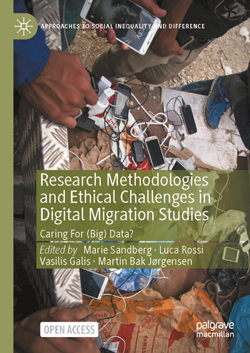Research methodologies and ethical challenges in digital migration studies - Caring for (big) data?
DIGINAUTS book launch

This Open Access book investigates the methodological and ethical dilemmas involved when working with digital technologies and large-scale datasets in relation to ethnographic studies of digital migration practices and trajectories. Digital technologies reshape not only every phase of the migration process itself (by providing new ways to access, share and preserve relevant information) but also the activities of other actors, from solidarity networks to border control agencies. In doing so, digital technologies create a whole new set of ethical and methodological challenges for migration studies: from data access to data interpretation, privacy protection, and research ethics more generally.
Of specific concern are the aspects of digital migration researchers accessing digital platforms used by migrants, who are subject to precarious and insecure life circumstances, lack recognised papers and are in danger of being rejected and deported. Thus, the authors call for new modes of caring for (big) data when researching migrants’ digital practices in the configuration of migration and borders. Besides taking proper care of research participants’ privacy, autonomy, and security, this also spans carefully establishing analytically sustainable environments for the respective data sets. Along with Science and Technology Studies and Feminist Theory, contributions draw on Anthropology of Migration and Critical Border and Migration Research, in which the exceptionality and irregularity of categories such as “refugee” and “migrant” are critically and self-reflexively assessed. In doing so, the book argues that it is essential to carefully reflect on researchers’ own positioning as being part of the challenge they seek to address.
Programme
- Marie Sandberg
Introduction and the scope of the book
On Contrapuntal Connectedness: Analysing Relations Between Social Media Data and Ethnography in Digital Migration Studies (with Nina Grønlykke Mollerup, Luca Rossi) - Luca Rossi
Migrant Digital Space: Building an Incomplete Map to Navigate Public Online Migration (with Vasiliki Makrygianni, Ahmad Kamal, Vasilis Galis) - Martin Bak Jørgensen
Impossible Research? Ethical Challenges in the (Digital) Study of Deportable Populations Within the European Border Regime (with Leandros Fischer)
followed by Q & A.
Discussant
Koen Leurs, assistant professor in Gender, Media and Migration Studies, Dept of Media and Culture, Utrecht University University of Utrecht: On Data and Care in Migration Contexts
Everyone is welcome.
Tea & Coffee will be served.
Publisher
Palgrave Macmillan, 2021.
With the generous support from the VELUX FOUNDATIONS the book is published open access
Editors
Marie Sandberg is an Associate Professor in Ethnology and Director of the Centre for Advanced Migration Studies (AMIS), The SAXO Institute, University of Copenhagen, Denmark.
Luca Rossi is Associate Professor, at the IT University of Copenhagen, Denmark.
Vasilis Galis is an Associate Professor in the Technologies in Practice (TIP) group at the IT University of Copenhagen, Denmark.
Martin Bak Jørgensen is Professor at DEMOS at the Department for Culture and Learning, Aalborg University, Denmark.
Further contributions by Nina Grønlykke Mollerup, Vasiliki Makrygianni, Leandros Fischer, Ninna Nyberg Sørensen, Anna Lundberg, Anders K. Munk, Koen Leurs, Giacomo Toffano
Kevin Smets, Laura Stielike.
The book is an outcome of the interdisciplinary research project ”Diginauts – Migrants’ digital practices in/of the European border regime”. Bridging insights from critical migration and border research, anthropology of migration, feminist theory, science and technology studies (STS) and social media and communications research within digital humanities, the book presents 11 original contributions to methodological and ethical challenges in the emerging field of digital migration research.
